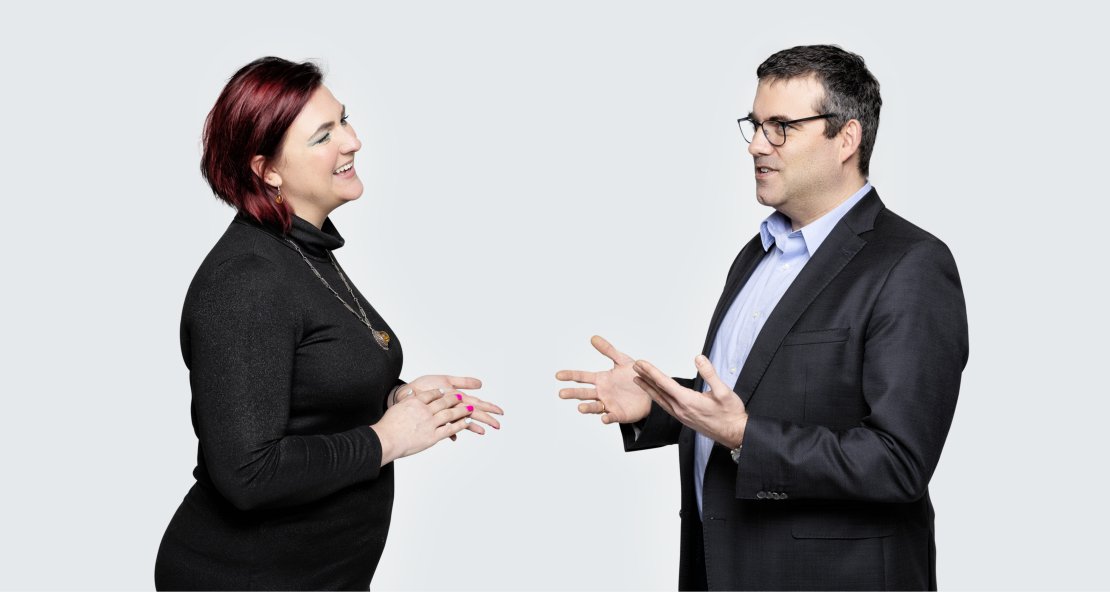Monday 8 February 2021
‘Scientists should actively shape society’
Changing the world, that's science too, according to Professor of Product-Market Relations Jörg Henseler. He feels that academics could be much more active, particularly in social science. Security officer Farien Prinsen Latka wants to know: how does he practise 'shaping'?
Farien: ‘Hi Jörg, you speak Dutch but you're originally from Germany…’
Jörg: ‘Yes, that's right. You know what I find so attractive about the UT? It really reflects what I like about Dutch culture, the freedom to develop yourself and encouragement of initiative. I see colleagues opening a DesignLab or designing a new course. Everyone gets opportunities and can take them. I see the UT as a big group of people who want to contribute something together. To science, but also to society.'
Farien: 'So it's not just the UT that benefits, but the whole world?'
Jörg: ‘Exactly. For me, that's shaping; not leaving things as they are. Many academics in social science tend to analyse how society is. But that doesn't change anything. I feel that my task is to challenge them to shape as well; to shape and organise society. That's science too.'
Farien: 'Why do you think that still doesn't happen very much?'
Jörg: 'Disciplines like sociology and business administration had to fight hard to be accepted as a science. As a result, academics in these disciplines sometimes behave like physicists. But they then forget that they can really change things. Compare it with medicine and human biology. They both study the body. But human biology mainly looks at how people function. The doctor asks: how can we make people even healthier? That's shaping. In medicine, no one questions whether it is science. Social science also needs shapers who not only study people and organisations, but also influence them. Communicating that message is my passion.'
Appearances are deceptive
Farien: 'How do you draw attention to your message?'
Jörg: 'I ask my students and PhD students not just to observe but also to innovate and suggest new solutions. I am supervising a PhD student who is studying the concept customer delight - like customer satisfaction but a step higher. Interesting, I told him, but show me how you can achieve that.'
Farien: 'What about your own research?'
Jörg: 'I'm working with colleagues on improving the sustainability of the Dutch packaging industry. It's awful to see how many businesses don't consider sustainability at all when choosing packaging. It's not easy, I know. Something might seem sustainable but isn't always. Consumers immediately associate plastic with plastic soup, but sometimes plastic packaging is better than paper.'
Without thinking
Farien: 'That reminds me of organic cucumbers in the supermarket. I always laugh when I see them; the organic ones are wrapped in plastic, but the standard ones aren't. I mean, that's a bit odd, isn't it?'
Jörg: 'Do you know why that is? My colleague Roland ten Klooster once explained it on the TV programme Groen Licht[1]. Organic cucumbers are produced with more care and attention. If they rot or get damaged in transport, the loss is relatively greater than for ordinary cucumbers. Therefore, you want to give the organic ones extra protection. In that sense, it's more sustainable to use extra packaging.'
Farien: 'I never thought of that! So there's a reason for it.'

Jörg: 'Sometimes things are packaged without any thought at all. So, you need to stay critical! Another thing we are trying to do is to think differently about packaging. No one wants the product “packaging”. What we want is the service that provides it: long shelf life, protection. Could we offer that service in a different way? For example, re-use or a deposit. Even though businesses often find it a lot of work and throwing it away is a cheaper option. But as society, you must keep the discussion going: what's more important to us - cheap, or less waste?'
Attract more publicity
Farien: 'What role can the academic play in this?'
Jörg: 'What you feel is most important is a social choice. We need to leave that to politicians. But science must clearly present the choices and show which values conflict with them. And explain choices, as Roland did so well. Many scientists don't like reaching out to the general publicity - neither do I - but we should do it more often.'
Farien: 'Why don't you like reaching out?'
Jörg: 'We are trained to focus on what we don't know yet, where the uncertainties lie, that's quite different from taking decisions. However, I do feel that scientists could give more advice. Many scientists work as consultants for businesses, for example. Why don't we work as much for consumers? A science like marketing, for example, gives lots of advice to suppliers, but why not advise consumers more often in public on the best way to buy?'
Farien: ‘Why isn’t that happening much yet?'
Jörg: 'It isn't really rewarded. For an academic, it's more important to receive recognition than to advise society. And if you see few examples of other colleagues, you are less likely to do it yourself. That's a challenge for us as a university: we need to teach junior researchers how to use the media and influence society. Even though more media appearances means less time for your core task, science. That's something we need to discuss; what's the right balance?
Farien: 'Talking to each other is key…'
Jörg: 'Yes, it's important to have more discussions together about what we feel is important. That's what I like about Shaping2030. It allows us to really discuss the values of the UT. That's not imposed from above; we discuss it together - like we're doing now.'
